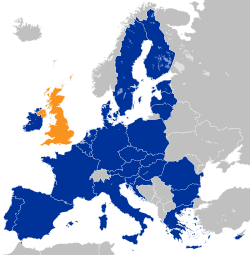Department for International Trade
 | |
| Department overview | |
|---|---|
| Formed | 14 July 2016 |
| Preceding department | |
| Jurisdiction | United Kingdom |
| Headquarters | 1 Victoria Street, London |
| Minister responsible | |
| Child agencies | |
| Website | Official website |
The Department for International Trade (DIT[1]) is a UK government department responsible for striking and extending trade agreements between the UK and non-EU states.[2] The department was created by Prime Minister Theresa May, shortly after she took office on 13 July 2016 following the United Kingdom's vote to leave the European Union.[3] DIT's purpose is to develop, coordinate and deliver a new trade policy for the UK, including preparing for and then negotiating free trade agreements and market access deals with non-EU countries. The new department is a specialised body with significant new trade negotiating capacity. It took on the responsibilities of UK Trade and Investment, which was previously operated by both the Foreign and Commonwealth Office and the Department for Business Innovation and Skills, it also took on the latter's other relevant trade functions; as well as responsibility for UK Export Finance.[4] It is overseen by the Secretary of State for International Trade, currently Liam Fox.[2]
.svg.png) |
| This article is part of a series on the politics and government of the United Kingdom |
|
|
|
|
| Part of a series of articles on the |
| United Kingdom in the European Union |
|---|
 |
|
Membership
Legislation |
|
Ministers
The Ministers in the Department for International Trade are as follows:[5]
| Minister | Rank | Portfolio |
|---|---|---|
| The Rt Hon. Liam Fox MP | Secretary of State | Overall responsibility for all policies and sectors, both directly and through his ministers of state. He will personally lead on the defence and security sector and will be involved in the most significant global deals across all sectors. |
| The Rt Hon. Greg Hands MP | Minister of State for Trade and Investment | Responsibility for lead on high value export and investment campaigns in these sectors: technology and smart cities, infrastructure, energy, healthcare and life sciences, cross-Whitehall alignment; the business forecasting function; UKEF; and policy direction on topics such as mergers and acquisitions and overseas direct investment. |
| Lord Price CVO | Minister of State for Trade Policy | Leading the Trade Policy Unit, which has a wide range of critical Trade Policy functions, including strategy and communications, organisation, operations, free trade agreements and the UK’s dealings with the World Trade Organisation. |
| Mark Garnier MP | Parliamentary Under-Secretary of State | Lead on high value export and investment campaigns in these sectors: financial services, advanced manufacturing and aerospace, automotive, bio-economy, consumer, creative and education. He will also be leading on work with the Export Control Organisation, the high volume export campaign, UK regional delivery and overseas partner delivery. |
References
- ↑ "Department for International Trade". GOV.UK. GOV.UK. 28 July 2016. Retrieved 28 July 2016.
- 1 2 "About - Department for International Trade - GOV.UK". www.gov.uk. UK Government. Retrieved 14 July 2016.
- ↑ "Theresa May signals Whitehall rejig with two new Cabinet posts | Civil Service World". www.civilserviceworld.com. CSW. Retrieved 14 July 2016.
- ↑ "Machinery of Government Changes:Written statement - HCWS94". Hansard. Hansard. 18 July 2016. Retrieved 22 July 2016.
- ↑ "Full list of new ministerial and government appointments: July 2016". GOV.UK. Prime Minister's Office, 10 Downing Street. 18 July 2016. Retrieved 24 July 2016.